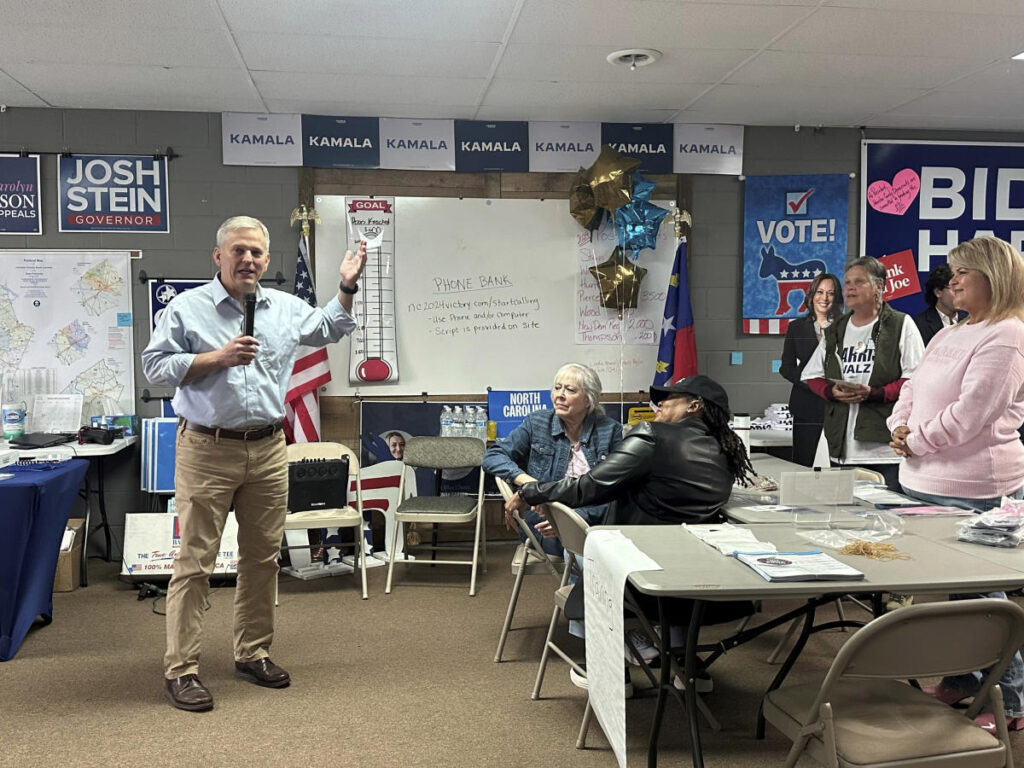In the run-up to the election for governor of North Carolina, Lt. Gov. Mark Robinson, a Republican backed by former President Donald Trump, spoke passionately to his supporters in Ellerbe, emphasizing his commitment to the people of North Carolina and his determination to win despite facing significant financial disadvantages against his Democratic opponent, Josh Stein. Robinson referred to the ongoing challenges as akin to being “on the battlefield” and underscored the importance of focusing on the immediate concerns of the electorate, such as food security and educational opportunities for their children. He dismissed negative narratives stemming from past comments reported by CNN, asserting that voters prioritize their daily struggles above sensationalized remarks made long ago.
The North Carolina governor’s race has garnered attention as a critical contest in a state known for its fierce political competitions and closely contested statewide elections. Initially anticipated as a close match, recent polling and campaign finance reports have indicated a more favorable outlook for Stein, who leads Robinson in multiple surveys. Stein’s campaign has reported an impressive $44.6 million in fundraising over a short period, coupled with an aggressive spending strategy that has allowed him to outpace Robinson by nearly four-to-one. This financial clout has facilitated continuous messaging aimed at discrediting Robinson’s candidacy, particularly regarding his controversial views on social issues.
Robinson’s campaign has been further complicated by the fallout from the CNN report revealing allegedly explicit and offensive online posts attributed to him from over a decade ago. While Robinson vehemently denies the claims and has pursued legal action against CNN, the allegations have created significant upheaval within his campaign. The negative press led to the resignation of key campaign staff and a withdrawal of financial support from major Republican organizations, forcing Robinson to pivot his strategy toward grassroots efforts rather than television advertising, which would traditionally drive a candidate’s visibility in the final stretch of a campaign.
Despite the challenges, Robinson maintains that his connection with grassroots supporters remains strong, noting that Trump continues to endorse him publicly, albeit with less visible support at campaign events. When asked about Robinson’s campaign amidst the tumult, Trump suggested that he remains uninformed about the developments, yet Robinson indicated that Trump encouraged him to persist in fighting for the governorship. Meanwhile, Stein remains focused and is urging a robust voter turnout effort, reminding his supporters that victory margins in previous elections have been slim and emphasizing a clear choice for voters between differing visions for the state.
The impact of natural disasters, particularly Hurricane Helene, has also influenced campaign dynamics, with both candidates attempting to navigate public sentiment related to disaster recovery efforts. Stein leveraged his position as attorney general to highlight his engagement with recovery efforts and his collaboration with federal authorities, while Robinson criticized the state administration’s initial response to the crisis in hopes of appealing to affected communities. Both candidates have defined their platforms around education and financial policies, with Robinson advocating for the continuation and expansion of current Republican policies, whereas Stein presents a platform aligned with the outgoing Democratic governor’s approach, focusing on progressive educational reforms and clean energy initiatives.
As the election approaches, Robinson retains dedicated support among conservative voters, who appreciate his narrative as a working-class leader with a strong stance on gun rights. His potential to become North Carolina’s first Black governor lends added historical significance to the race. Conversely, Stein aims to secure his position as the state’s first Jewish governor, signaling a push for diversity in North Carolina’s political landscape. Supporters of both candidates express differing views on the implications of the ongoing controversies, illustrating a deeply polarized electorate as Robinson faces the dual hurdles of fundraising, candidate image, and the struggle for voter engagement leading into a central election that could have broader implications for the state’s political future.

